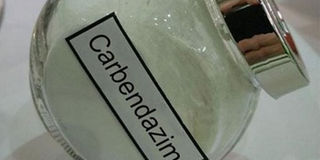Blame weak policies for harmful products

Carbendazim is a harmful active ingredient that is sold in the Kenyan market as a fungicide. PHOTO | FOTOSEARCH
What you need to know:
- Carbendazim is a harmful active ingredient that is sold in the Kenyan market as a fungicide.
- The Pest Control Products Act does not state environmental and/or human health as possible concerns during registration
We have all purchased tomatoes, mangoes, French beans, broccoli, onions and maize. The probability of having consumed harmful chemicals such as carbendazim from such products is high.
A Route to Food Initiative report says at least 32 per cent of pesticide-active ingredients that are registered and sold in products in Kenya have been withdrawn from the European market due to their potential serious impact on human and environmental health.
Carbendazim is a harmful active ingredient that is sold in the Kenyan market as a fungicide. It is among the active ingredients sold in Kenya that are considered hazardous because their interaction with the human body can cause cancer, change the genetic composition of an offspring when exposed to pregnant women, destroy nerve tissues and increase or decrease the activity of male or female hormones when they interact with the hormonal systems.
FOOD SECURITY
They are also known to have a prolonged presence in the environment. This poses a serious threat to the ecosystem, fish species when they enter the water bodies and bee populations, threatening food security since food and seed production rely on pollination.
According to the European Union pesticides database, carbendazim was banned in 2011 and is not approved for use in the United States and the United Kingdom. Ironically, 75 of these harmful products are mostly sold by companies from Europe yet they are withdrawn from the European market.
So, why does the Pest Control Products Board (PCPB) — the statutory organisation that regulates the manufacture, distribution, use, importation and exportation of pest control products — allow the use of these harmful chemicals?
During registration of a product, the manufacturer submits technical information about their harmful active ingredients to the PCPB. Where is this information?
Another concern is that, during the registration of new products in Kenya, only the purity and efficacy of the product is tested. No data on human and environmental health under local conditions is taken into consideration.
HUMAN HEALTH
The Pest Control Products Act does not state environmental and/or human health as possible concerns during registration. Why?
PCPB needs to address these concerns to uphold Kenyans’ right to safe food and a healthy environment as stipulated in Articles 42 and 43 of the Constitution.
It also needs to urgently withdraw these products, which have negative impacts on human health, from the Kenyan market and hold accountable the agrochemical corporations supplying them.
The Ministry of Agriculture, through agricultural extension officers, ought to promote farming practices that are free from harmful pesticides — such as ecological farming.
That will save farmers and consumers of farm produce from the effects of exposure to harmful chemicals. Legal consequences should be imposed on the harmful pesticides to reduce their usage.
The ministries of Health and Environment need to regularly provide information on pesticide residues in food and water and their impact on human health and environment. Doing so will safeguard Kenyan’s right to safe food and a healthy environment.
Ms Nasike is a Greenpeace Africa’s Food for Life campaigner. [email protected]





